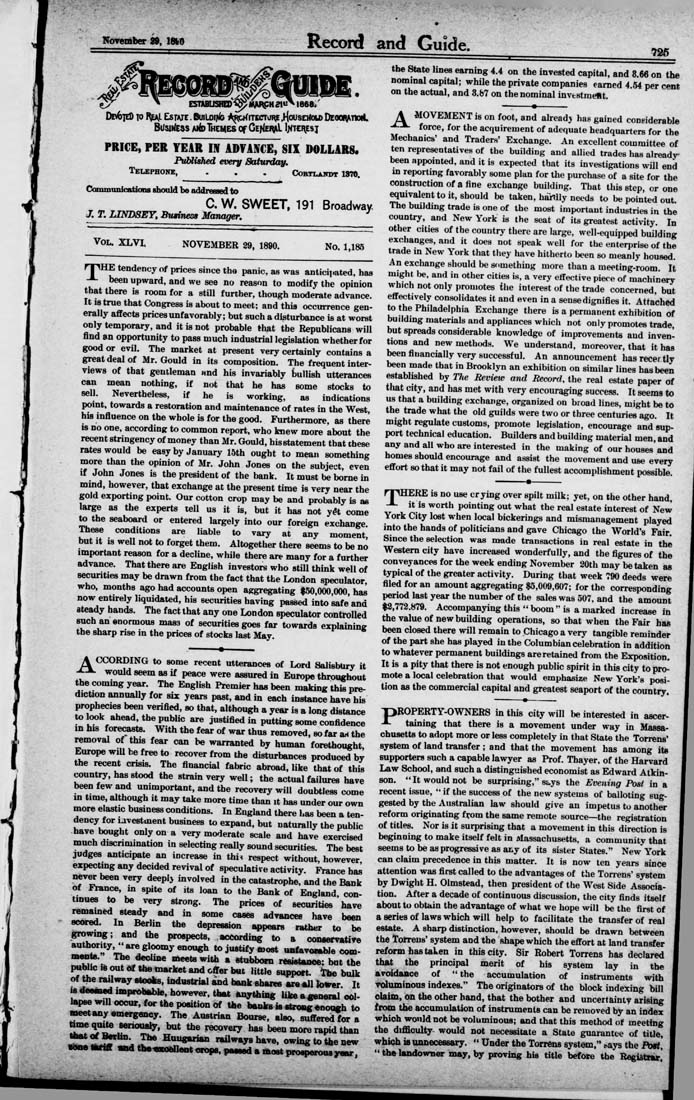Columbia University Libraries Digital Collections: The Real Estate Record
Use your browser's Print function to print these pages.
Real estate record and builders' guide: v. 46, no. 1185: November 29, 1890

Text version:
Please note: this text may be incomplete. For more information about this OCR, view About OCR text.
"^1>K^'- VawtAha M, lekO Record and Guide. 726 ^ ESTABIJSIIED^IIWPK21u^ie68^ Dr^rpEO 101^ Estate . BuiLoi^ A^itcctoi^ J^ouseHou) DEoavknoil. Busntess Alb Thekes or GeHei^ I|(tei^s j PRICE, PER TEAR IN ADTANCE, SIX DOLLARS. Puttished every aaiurday. Telephone, . . . Cobtulhdt 1370. Communicatjopg shoald be addrocod to C. W. SWEET, 191 Broadway J. T. LINDSEY, Buaineas Manager. Vol. XLVI NOVEMBER 29, 1890. No. 1,185 rpHE tendency of prices since the panic, as was anticii«ted, has been upward, and we see no reason to modify the opinion that there is room for a stUl further, though moderate advance. It is true that Congress is about to meet; and thia occurrence gen¬ erally aflFects prices unfavorably; but such a disturbance is at worst only temporary, and it is not probable that tbe Republicans will find an opportunity to pass much industrial legislation whether for good or evil. The market at present very certainly contains a great deal of Mr. Gould in its composition. The frequent inter¬ views of that gentleman and his invariably fcullish utterances can mean nothing, if not that he has some stocks to sell. Nevertheless, if he is working, as indications point, towards a restoration and maintenance of rates in the West his influence on the whole is for the good. Furthermore, as there 18 no one, according to common report, who knew more about the recent stringency of money than Mr. Gould, hisstatement that tbese rates would be easy by January 16th ought to mean something more than the opinion of Mr. John Jones on the subject, even if John Jones is the president of the bank. It must be bome in mind, however, that exchange at the present time is very near the gold exporting point. Our cotton crop may be and probably is as large as the experts tell us it is, but it has not y^t come to the seaboard or entered largely into our foreign exchange. These conditions are liable to vary at any moment, but It 18 well not to forget them. Altogether there seems to be no important reason for a decline, while there are many for a further advance. That there are English investors who stiU think well of securities may be drawn from the fact that the London speculator who, months ago had accounts open aggregating $50,000,000, ha^ now entirely liquidated, his seciurities having passed into safe and steady hands. The fact that any one London speculator controlled such an enormous mass of securities goes far towards explaining the sharp rise in the prices of stocks last May. A CCORDING to some recent utterances of Lord Salisbtiry it ^ would seem as if peace were assured in Europe throi«faout the coming year. The English Premier has been making this pre¬ diction annuaUy for six years past, and in each instance have his prophecies been verified, so that, although a year is a long distance tolook ahead^thepubUc are justified in putting some confidence in his fore<»8t8. With the fear of war thus removed, so far an the removal of this fear can be warranted by human forethought, Europe WlU be free to recover from the disturbances produced by the recent crisis. The financial fabric abroad, lUte that of this country, has stood the strain very well; the actual failures have been few and unimportant, and the recovery wiU doubtless come m time, although it may take more time than it has under our own more elastic business conditions. In England there Las been a ten¬ dency for mvestoient business to expand, but naturally the public have bought only on a very moderate scale and have exereised much discrimination in selecting reaUy sound securities. The best judges anticipate an increase in thi^ respect without, however expecting any decided revival of speculative activity. France hw nevOTbeen very deeplj involved in the catastrophe, and the Bank of France, in spite of its loan to the Bank of England con¬ tinues to be veiy strong. The prioee of securities have remained steady and in some cases advances have been sooreo. m Berlin the defuression appears rntber to be growing; and the prospects, acterding to a ooaservatite authority, "are gloomy enough to justify «,ost uafevombie com¬ mute. The aecline tiieet» with a stubbon rteistoiMa: bat tbe public w out «f Mw^narket and offer but little support. ^ bulk of the raUway stoote, industrial iad baok^baras ara «1I krtw. It IS dnnimd iajwoh^ble. however, that imythiag Uke a^eaeml o